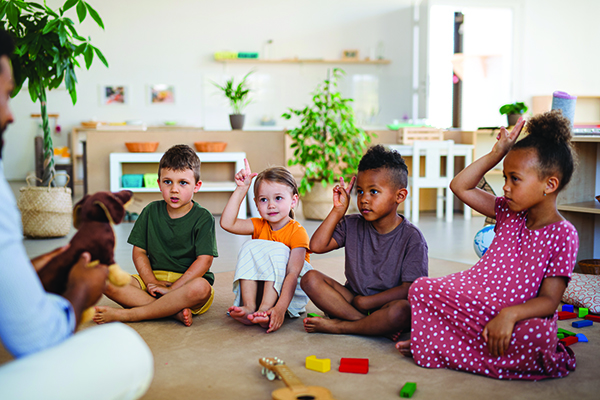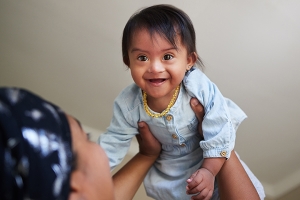
There’s something magical about a baby’s first words. More than any other milestone, the first “mama” or “dada” holds the promise of deeper connection with our children. While every baby develops speech at her own pace, many will have a word or two by 12 months. For eager parents, that’s a long wait! But remember, every coo or gurgle is a step toward healthy communication. We spoke with Speech-Language Pathologist Melissa Minney of Raising Little Talkers to discuss simple ways to give babbling a boost.
Start Slow
According to Minney, it’s perfectly fine to focus on sleeping and feeding in the first few months with a new baby. Once life begins to feel more settled, activities that promote speech and language development can be incorporated into daily interactions.
Get Face to Face
In-person face time (not the audio/video version) is essential for speech and language development. It also helps babies develop social-emotional skills. “Getting face-to-face with your baby when you talk gives them the opportunity to ‘soak up’ your mouth movements and facial expressions,” says Minney. Find key moments during the day to be intentional about face-to-face interactions. Mealtimes, bath time and diapering are great opportunities to tell stories and sing songs while offering lots of eye contact.
Use “Parentese”
You’ve heard it before! Research shows that the high-pitched, sing-song voice people often use when talking to babies holds their attention longer. Using “parentese” might help increase the benefits of face-to-face time. While some parents find it quite natural, others might need to make a conscious effort. It’s worth a try!
Imitate Your Baby
Are you ever tempted to repeat your baby’s sweet sounds? There’s a good reason for this natural urge. “Babies are born with mirror neurons that allow them to mimic your facial expressions and even your voice,” says Minney. “By imitating your baby’s sounds, you’re paving the way for back-and-forth imitation, which is an early precursor to back-and-forth communication, like having conversations.”
Choose Toys Wisely
According to Minney, the best toys for speech and language development are the ones your child finds interesting. “Babies and toddlers are more likely to communicate when they are genuinely interested in an object or activity, so I tell parents to use whatever their child naturally gravitates toward,” she says. Simple household items like food containers and keys can often hold a baby’s interest as well.
It’s important to note that research shows when parents and little ones use electronic toys, parents model less language and children vocalize less. “A good rule of thumb: If the toy is making noise, then likely the parent and child are not,” says Minney. Consider using these types of toys in moderation.
Select Simple Books
Minney says her favorite books feature simple images that babies will recognize—like animals, familiar objects or other children. Interactive books with flaps, slides or textures are another excellent choice. Every new parent’s collection should also include some board books or Indestructibles that are sturdy enough for babies to explore with their mouths.
Soak Up Story Time
A parent’s lap is a great spot for baby during story time because it encourages cuddling and connection. However, Minney recommends switching things up from time to time, so that parent and child can see each other’s faces. “Getting face-to-face while reading together allows you to share the book in a new way,” she says. “You see each other's facial expressions, your child can watch you speak, and you can gauge your child’s interest by observing which part of the page your child is looking at.” One of the best ways to achieve this during story time is to prop baby up on the sofa or a nursing pillow while mom or dad sits on the floor at eye level. What a precious view!
Remember, You’re Doing Great!
More than anything, Minney wants parents to know they are doing a great job—no matter how their child’s communication skills develop. “Parents do not cause speech and language delays except in extreme cases of abuse and neglect. It’s easy for parents to blame themselves and feel guilty for not doing enough, but the reality is, some children just need more support than others,” she says.
When to Seek a Speech-Language Evaluation
While all children develop at their own pace, Minney says there are red flags that might indicate a child’s communication skills are developing outside the normal range. Parents should consult their pediatrician and seek an evaluation with a speech-language pathologist if any of the following concerns are present:
- Difficulty making and maintaining eye contact with an adult by 6 months of age
- No big smiles or other warm, joyful expressions when interacting with an adult by 6 months
- No back and forth of sounds, smiles, or other facial expressions with an adult by 9 months
- No babbling by 10 months (get hearing checked at this point, even if the child passed their newborn hearing screening)
- Not using meaningful gestures to communicate by 12 months (e.g., reaching arms up to be picked up, waving, clapping, reaching, showing, etc.)
- Not responding to their name by 12 months
- Does not point to objects or show interest by 14 months
- Does not follow simple and familiar directions by 18 months
- Fewer than 50 words at 24 months
- No two-word meaningful phrases by 24 months
- No back-and-forth conversational turn-taking by 36 months
- Loss of babbling, speech or social skills (like eye contact) at any age
Additional Free Tips
Follow Minney on Instagram @RaisingLittleTalkers for free tips. Visit her website to learn more about her free workshop for parents of babies and toddlers, as well as a free communication milestones checklist: www.raisinglittletalkers.com.
Anne Malinoski is an award-winning writer who lives in East San Diego County with her husband and two sons.
____________














